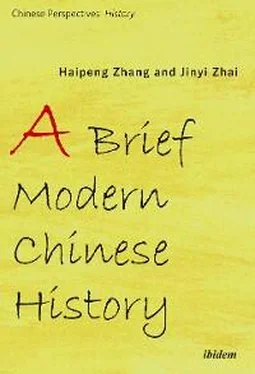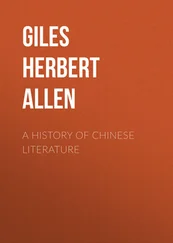1See: Chapter 71 of Chouban yiwu shimo: Xianfeng chao 筹办夷务始末 (咸丰朝) (The management of foreign affairs in its entirety: The Reign of Emperor Xianfeng), 18; Chapter 4 of Xianfeng chao chouban yiwu shimo buyi 咸丰朝筹办夷务始末补遗 (A supplement to Chouban yiwu shimo: Xianfeng chao ), Part One, p. 680.
2See: Chapter 71 of Chouban yiwu shimo: Xianfeng chao, p. 28.
3See: Liu Danian, Zhongguo jindaishigao , p. 117.
4See: Vol. 7 of Zeng Guofan quanji , pp. 84–85.
5Zhao Erxun 赵 尔 巽 et al., Qing shi gao 清 史 稿 [A draft history of Qing] (Beijing: Zhonghua Book Company, 1977), vol. 38, pp. 11686–11687.
6See: Vol. 3 of Taiping Tianguo shiliao congbian jianji 太平天国史料丛编简辑 [Selected primary sources in relation to Taiping Tianguo] (Beijing: Zhonghua Book Company, 1962), p. 411.
7See: Vol. 3 of Zeng Guofan quanji , p. 186.
8See: Gu Tinglong 顾 廷 龙 and Dai Yi 戴 逸 eds., Li Hongzhang quanji [Complete works of Li Hongzhang] (Hefei: Anhui Educational Publishing House, 2007), vol. 29, p. 218.
9See: Chapter 25 of Chouban yiwu shibo: Tongzhi Chao (The management of foreign affairs in its entirety: The Reign of Emperor Tongzhi), pp. 1–2.
10See: Vol. 10 of Qing Guangxu chao Zhong Ri jiaoshe shiliao 清光绪朝中日交涉史料 [Primary sources in relation to the Sino-Japanese relations in the reign of Emperor Guangxu] (Beijing: The Palace Museum, 1932), p. 2.
11Wang Tao 王韬, Taoyuan wenlu waibian 弢园文录外编 [Supplement to Collected Works of Wang Tao ] (Beijing: Zhonghua Book Company, 1959), p. 22, p. 23.
12See: Zhongguo shixue hui, Wuxu bianfa 戊戌变法 [Hundred Days’ Reform] (Shanghai: Shanghai People’s Publishing House, 1957), vol. 1, p. 40.
13See: Ma Jianzhong 马建忠, Shike zhai jiyan 适可斋记言 [Writings in the Appropriateness Pavilion] (Beijing: Zhonghua Book Company, 1960), p. 9.
14See: Feng Guifen 冯桂芬 and Ma Jianzhong, Cai xixue yi—Feng Guifen Ma Jianzhong ji 采西学议——冯桂芬马建忠集 [On learning from the West: Selected writings of Feng Guifen and Ma Jianzhong] (Shenyang: Liaoning People’s Publishing House, 1994), p. 47.
15See: Zhongguo shixue hui, Yangwu yundong 洋 务 运 动 [The Self-Strengthening Movement] (Shanghai: Shanghai People’s Publishing House, 1961), vol. 1, p. 504.
16Xue Fucheng 薛福成, Xu Fucheng xuanji 薛福成选集 [Selected writings of Xue Fucheng] (Shanghai: Shanghai People’s Publishing House, 1987), p. 22.
17See: Cai xixue yi—Feng Guifen Ma Jianzhong ji , p. 84.
18Ibid., p. 125, p. 134.
19Ma Jianzhong, Shike zhai jiyan , p. 77, p. 79.
20See: Zhao Jing 赵婧 and Yi Menghong 易梦虹, eds., Zhongguo jindai jingji six-iang ziliao xuanji 中国近代经济思想资料选辑 [Economic thoughts in the modern China: A selection] (Beijing: Zhonghua Book Company, 1982), vol. 2, p. 84.
21See: Wang Tao, Taoyuan wenlu waibian , p. 301, p. 22.
22Ma Jianzhong, Shike zhai jiyan , p. 31.
23See: Xinjiang tuzhi 新疆图志 (An illustrated annals of Xinjiang), Chapter 54, the 2nd part of Jiaoshe 交涉 (Foreign relations), p. 2.
24Zhang Haipeng and Li Guoqiang 李国强, “Lun Maguan tiaoyue yu Diaoyudao wenti 论《马关条约》与钓鱼岛问题” (The Treaty of Shimonoseki and the Diaoyudao Issue), Renmin ribao 人民日报 ( The People’s Daily ), 8 May, 2013, p. 9.
25See: Zhang Zhiyong 张志勇, Hede yu wan Qing Zhong Ying guanxi 赫德与晚清中英关系 [Rober Hart and Sino-Britain relations in the late Qing] (Shanghai: Shanghai Bookstore Publishing House, 2012), p. 76.
26Ibid., p. 51.
27For Li Hongzhang’s argument, see: Vol. 33 of Li Hongzhang quanji , p. 228.
28See: Vol. 3 of Qing ji waijiao shiliao 清季外交史料 [Primary resources in relation to the late Qing’s foreign policies] (Changsha: Hunan Normal University Press, 2015), p. 809.
29Ibid., vol. 45, p. 14.
30“Shelun: Lun Zhongguo muxia qingxing weiyou yizhan 社论: 论中国目下情形惟有一 战” (China has no alternative but to fight under such circumstances), Shun Pao 申 报 ( Shen Pao , or Shanghai News ), 17 July, 1884.
31See: “Sir H. Parkes to Vice-Admiral Sir W. Dowell,” in Correspondence Respecting the State of Affairs in China , p. 38.
32Liu Danian, Zhongguo jindaishigao , p. 351.
33Wang Lixin 王 立 新, Meiguo chuanjiaoshi yu wan Qing Zhongguo xiandaihua 美 国传教士与晚清中国现代化 [American missionaries and the late Qing’s pursuit of modernity] (Tianjin: Tianjin People’s Publishing House, 1997), p. 18.
34Gu Changsheng 顾长声, Chuanjiaoshi yu jindai Zhongguo 传教士与近代中国 [Missionaries and the modern China] (Shanghai: Shanghai People’s Publishing House, 1981), p. 118.
35Qi Qizhang 戚其章 and Wang Ruhui 王如绘, Wan Qing jiao’an jishi 晚清教案纪事 [Annals of incidents involving the Christian missionaries] (Beijing: The Oriental Press, 1990), p. 109.
36For this letter, see: Vol. 5 of Qing mo jiao’an 清 末 教 案 [Incidents involving the Christian missionaries in the late Qing] (Beijing: Zhonghua Book Company, 2000), p. 31.
37See: Vol. 11 of Zeng Guofan quanji , p. 509.
38See: Ibid., vol. 12, p. 83; vol, p. 31, p. 405.
39See: Chapter 79 of Chouban yiwu shimo: Tongzhi chao , p. 3198.
40For the statistics, see: Fan Baichuan 樊百川, Qing ji de yangwu xinzheng 清季的洋务 新 政 [The Self-Strengthening Movement in the late Qing] (Shanghai: Shanghai Bookstore Publishing House, 2003), p. 22.
41Ibid.
42See: Zhang Haipeng, “Shijiu shiji Zhong Ri liangguo zaoqi xiandaihua bijiao yanjiu 19世纪中日两国早期现代化比较研究” (Tentatively pursuing modernity in nineteenth-century China and Japan: A comparative reexamination), in Zhang Haipeng, Zhongguo jindai-shi jiben wenti yanjiu 中国近代史基本问题研究 [Basic questions with respect to modern Chinese history] (Beijing: China Social Sciences Press, 2013), p. 355.
43For a more detailed discussion about Yoshida Shoin and Fukuzawa Yukichi, see: Mizuno Akira 水野明, “Riben qinlue Zhongguo sixiang de yanzheng 日本侵略中国思想的验 证” (An investigation of Japan’s conceptions of invading China), Kang Ri zhanzheng yan-jiu 抗日战争研究 (Journal of China’s Resistance Against Japan), no. 1 (1995), pp. 195–204.
44See: Ogawa Mataji 小川又次, Qing guo zhengtao fanglüe 清国征讨方略 (The general plan of conquering China), ibid., pp. 207–218.
45Kiyoshi Inoue 井上清, trans. Institute of History (Tianjin), Riben lishi 日本历史 [History of Japan] (Tianjin: Tianjin People’s Publishing House, 1974), vol. 3, p. 668. For the English translation of the Japanese Emperor’s words, see: Nihonggi 日 本 纪: Chronicles of Japan from the Earliest Times to A.D. 697 , trans. William George Aston (London: Kegan Paul, Trench, Trübner & Co., Limited, 1896), p. 131.
46See: Qi Qizhang ed., Zhongguo jindaishi ziliao congkan xubian: Zhong Ri zhanzheng 中国近代史资料丛刊续编: 中日战争 [A sequel to Primary Sources regarding the Modern Chinese History : The First Sino-Japanese War] (Beijing: Zhonghua Book Company, 1993), vol. 6, p. 123, p. 132. It is based on two pieces of Munakata Kotaro’s diary. A full Chinese translation of this spy’s diary is now available; see: Munakata Kotaro 宗方小太郎, trans. Gan Huijie 甘慧洁, Zongfang Xiaotailang riji 宗方小太郎日记 [The Diary of Munakata Kotaro: 1887–1923] (Shanghai: Shanghai People’s Publishing House, 2017), vols, pp. 1–3.
Читать дальше












